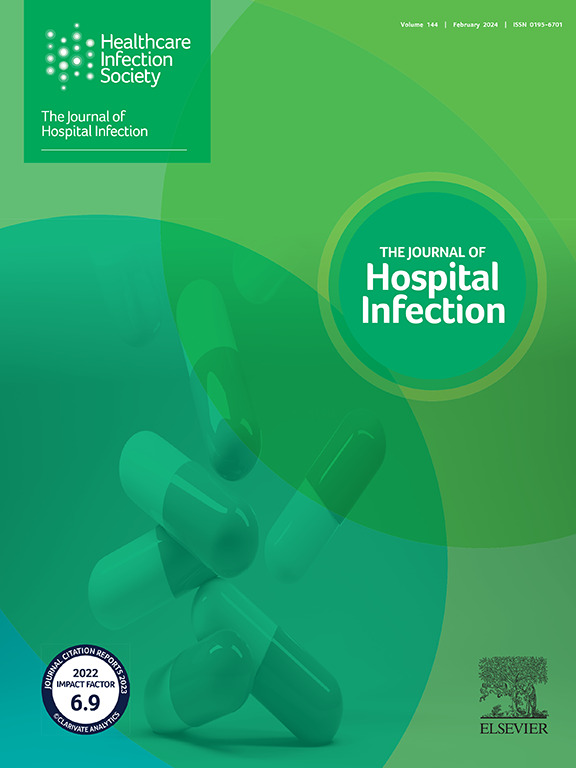Association between use of medication and hospital-acquired infections: a multi-centre case–control study
IF 3.9
3区 医学
Q1 INFECTIOUS DISEASES
引用次数: 0
Abstract
Objectives
Hospital-acquired infections (HAIs) pose a significant risk to hospitalized patients. This study aimed to assess the relationship between the use of medication and the occurrence of HAIs.
Methods
This retrospective multi-centre case–control study included 604 HAI cases reported across three hospitals in north-west China from January 2023 to July 2024. The control group consisted of 604 patients without HAIs from the same period and same hospitals. Multi-variable log-binomial regression was performed to assess the association between use of medication and HAIs, adjusting for confounding variables. A trend Chi-squared test was used to evaluate whether the risk of HAIs increased with prolonged use of medication.
Results
Univariate analysis revealed that the use of proton pump inhibitors (PPIs), antibiotics, glucocorticoids and H2 receptor blockers increased the risk of HAIs significantly (P<0.05). Multi-variable log-binomial regression indicated that the use of PPIs, glucocorticoids and H2 receptor antagonists was associated with increased risk of HAIs, with relative risks of 1.37 [95% confidence interval (CI) 1.19–1.57], 1.33 (95% CI 1.10–1.62) and 1.84 (95% CI 1.04–3.24), respectively. The period of use of PPIs and glucocorticoids was significantly longer in the case group.
Conclusions
Use of glucocorticoids, PPIs and H2 receptor antagonists increases the risk of HAIs, with prolonged use exacerbating this risk. The use of a single antibiotic for up to 10 days is not associated with HAI acquisition.
药物使用与医院获得性感染之间的关系:一项多中心病例对照研究
目的:医院获得性感染(HAIs)对住院患者构成重大风险。本研究旨在评估药物使用与HAIs发生的关系。方法:本回顾性多中心病例对照研究纳入了2023年1月至2024年7月中国西北地区三家医院报告的604例HAI病例。对照组为来自同一时期同一医院的604例无HAIs患者。我们进行了多变量对数二项回归来评估药物使用与HAIs之间的关系,调整了混杂变量。趋势卡方检验也用于评估HAIs的风险是否随着用药时间的延长而增加。结果:单因素分析显示,质子泵抑制剂(PPIs)、抗生素、糖皮质激素和H2受体阻滞剂的使用显著增加了HAIs的风险(P < 0.05)。多变量对数二项回归显示,ppi、糖皮质激素和H2受体拮抗剂与HAIs风险升高相关,相对危险度(rr)分别为1.37 (95% CI: 1.19-1.57)、1.33 (95% CI: 1.10-1.62)和1.84 (95% CI: 1.04-3.24)。病例组持续使用PPIs和糖皮质激素的时间明显更长。结论:糖皮质激素、PPIs和H2受体拮抗剂增加HAI的风险,长期使用会加剧这种风险。使用一种抗生素长达10天与感染HAI无关。
本文章由计算机程序翻译,如有差异,请以英文原文为准。
求助全文
约1分钟内获得全文
求助全文
来源期刊

Journal of Hospital Infection
医学-传染病学
CiteScore
12.70
自引率
5.80%
发文量
271
审稿时长
19 days
期刊介绍:
The Journal of Hospital Infection is the editorially independent scientific publication of the Healthcare Infection Society. The aim of the Journal is to publish high quality research and information relating to infection prevention and control that is relevant to an international audience.
The Journal welcomes submissions that relate to all aspects of infection prevention and control in healthcare settings. This includes submissions that:
provide new insight into the epidemiology, surveillance, or prevention and control of healthcare-associated infections and antimicrobial resistance in healthcare settings;
provide new insight into cleaning, disinfection and decontamination;
provide new insight into the design of healthcare premises;
describe novel aspects of outbreaks of infection;
throw light on techniques for effective antimicrobial stewardship;
describe novel techniques (laboratory-based or point of care) for the detection of infection or antimicrobial resistance in the healthcare setting, particularly if these can be used to facilitate infection prevention and control;
improve understanding of the motivations of safe healthcare behaviour, or describe techniques for achieving behavioural and cultural change;
improve understanding of the use of IT systems in infection surveillance and prevention and control.
 求助内容:
求助内容: 应助结果提醒方式:
应助结果提醒方式:


